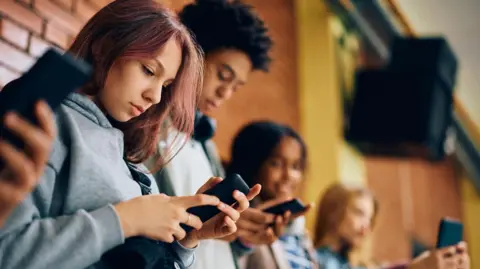
Banning phones in schools is not linked to students getting higher grades or having better mental well-being, according to the first study of its kind.
The study found no difference in students' sleep, classroom behavior, exercise, or overall phone usage between schools with phone bans and those without.
However, spending more time on smartphones and social media was linked to worse outcomes in all these areas.
This study, the first in the world to examine school phone rules alongside student health and education, contributes to a heated debate in homes and schools in recent years.
Dr. Victoria Goodyear, the study's lead author, told the BBC that the findings do not oppose smartphone bans in schools, but suggest that bans alone are not enough to address the negative impacts.
She emphasized the need to reduce the time students spend on their phones, saying, "We need to do more than just ban phones in schools."
The University of Birmingham's findings, peer-reviewed and published by the Lancet's journal for European health policy, compared 1,227 students and the smartphone use rules of their 30 different secondary schools during breaks and lunchtimes.
The schools were selected from a sample of 1,341 mainstream state schools in England. The paper states that schools restricting smartphone use did not seem to achieve the intended improvements in health, well-being, and focus during lessons.
However, the research found a link between more time spent on phones and social media and worse mental well-being and health, less physical activity, poorer sleep, lower grades, and more disruptive classroom behavior.
The study used the internationally recognized Warwick-Edinburgh Mental Wellbeing Scales to assess participants' well-being. It also examined students' anxiety and depression levels.
It asked form teachers whether their students were on target, below target, or above target in English and math.
Joe Ryrie, director of the campaign group Smartphone Free Childhood, told BBC Radio 4's Today program that the results were "surprising" because teachers in their network had reported benefits from implementing phone bans at their schools.
He also mentioned that the average time children in the study reported spending on their phones—four to six hours—was a "terrifying amount of time to spend scrolling or swiping."
He stated that stricter regulations are needed to make social media platforms safer and less addictive for children.
Charlie got his first smartphone in Year 8, but a strict ban meant he couldn't bring it to school until sixth form. At Twyford School in west London, anyone caught with a smartphone in the lower school has it confiscated for the rest of the term. Senior staff say this "unpopular" punishment is an effective deterrent.
Charlie says the smartphone ban "forces you to hang out and chat with your friends."
Now in Year 13, he believes the ban in lower school has "probably" helped him spend less time on social media, but he notes that many of his friends are still "on their phones all the time."
